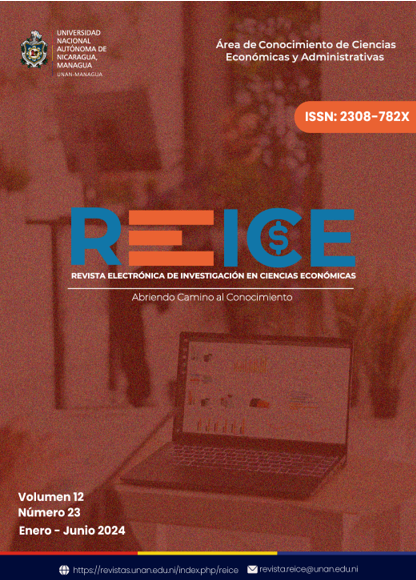Innovation and adaptation in organizational culture: a documentary study
DOI:
https://doi.org/10.5377/reice.v12i23.18271Keywords:
organizational culture, innovation, adaptation, typologies, organizational changeAbstract
A challenge that organizations commonly face is how to survive and continue functioning over time. The answer to this challenge commonly lies in having the ability to innovate and adapt to their environment, processes that are usually influenced by an organizational variable that, among others, has sparked the interest of organizational researchers since the 1980s: organizational culture. The purpose of this paper is to examine how this phenomenon has been related to the innovation and adaptation processes of organizations. For this purpose, a hermeneutic, documentary and descriptive qualitative study was carried out. The results reflect that within organizational studies there is an important relationship between both variables and that, within the typologies of culture that various authors have proposed, elements that promote innovation and adaptation have been considered. It is concluded, among others, that a company seeking to implement profound changes must examine whether its culture is appropriate for it.
Downloads
867
References
Barney, J. B. (1986). Organizational Culture: Can It Be a Source of Sustained Competitive Advantage? Academy of Management Review, 11(3), 656–665. https://doi.org/https://doi.org/10.5465/amr.1986.4306261
Barney, J. B. (1991). Firm resources and sustained competitive advantage. Journal of Management, 17(1). https://doi.org/https://doi.org/10.1177/014920639101700108
Belias, D., Koustelios, A., Vairaktarakis, G., & Sdrolias, L. (2015). Organizational Culture and Job Satisfaction of Greek Banking Institutions. Procedia - Social and Behavioral Sciences, 175, 314–323. https://doi.org/10.1016/j.sbspro.2015.01.1206
Cameron, K. S., & Quinn, R. E. (1999). Diagnosing and Changing Organizational Culture: Based on the Competing Values Framework. Addison-Wesley.
Cameron, K. S., & Quinn, R. E. (2011). Diagnosing and Changing Organizational Culture: Based on the Competing Values Framework. Wiley.
Deal, T. E., & Kennedy, A. A. (1982). Corporate Cultures: The Rites and Rituals of Corporate Life. Addison-Wesley.
Drucker, P. F. (1955). “Management Science” and the Manager. Management Science, 1(2), 115–126.
Dylan, B. (1964). It´s Alright Ma, I’m Only Bleeding [canción]. In Bringing It All Back Home. https://www.bobdylan.com/songs/its-alright-ma-im-only-bleeding/
Fayol, H. (1917). Administration industrielle et générale: prévoyance, organisation, commandement, coordination, contrôle. Dunod.
Fine, G. (1984). Negotiated Orders and Organizational Cultures. Annual Review of Sociology, 10(1), 239–262. https://doi.org/10.1146/annurev.soc.10.1.239
Harrison, J. R. (1972). Understanding your organization’s character’. Harvard Business Review, 50(23), 119–128. http://www.uulead.org/docs/orgcharacter.pdf
Harrison, J. R. (1995). The Collected Papers of Roger Harrison (1era.). McGraw-Hill.
Hatch, M. J., & Cunliffe, A. L. (2013). Organization Theory: Modern, Symbolic and Postmodern Perspectives (3ra. ed.). Oxford University Press.
Hernández Sampieri, R., Fernández Collado, C., & Baptista Lucio, M. del P. (2014). Metodología de la investigación (6a. ed.). McGraw-Hill.
Iljins, J., Skvarciany, V., & Gaile-Sarkane, E. (2015). Impact of Organizational Culture on Organizational Climate During the Process of Change. Procedia - Social and Behavioral Sciences, 213, 944–950. https://doi.org/10.1016/j.sbspro.2015.11.509
Intxaurburu Clemente, M. G., & Ochoa Laburu, C. (2005). Una revisión teórica de la herramienta de benchmarking. Revista de Dirección y Administración de Empresas, 12, 73–103.
Jones, G. (2013). Teoría organizacional. Diseño y cambio en las organizaciones. Pearson Educación.
Kast, F. E., & Rosenzweig, J. E. (1974). Organization and Management: A Systems Approach. McGraw-Hill.
Katz, D., & Kahn, R. L. (1966). The social psychology of organizations. In The social psychology of organizations. Wiley.
Lewin, K. (1951). Field theory in social science: selected theoretical papers (Edited by Dorwin Cartwright.). In Field theory in social science: selected theoretical papers (Edited by Dorwin Cartwright.). Harpers.
Martínez Ruíz, H. (2012). Metodología de la investigación. CENGAGE Learning.
Mayo, E. (1933). The Human Problems of an Industrial Civilization. Macmillan.
McClelland, D. C. (1961). The achieving society. Van Nostrand.
McGrath, R. G. (2006). Beyond contingency: from structure to structuring in the design of the contemporary organization. In S. R. Clegg, C. Hardy, T. B. Lawrence, & W. R. Nord (Eds.), The SAGE Handbook of Organization Studies. SAGE Publications Ltd. https://doi.org/10.4135/9781848608030.n20
Nonaka, I., & Takeuchi, H. (1995). The knowledge-creating company. Oxford University Press.
Panagiotis, M., Alexandros, S., & George, P. (2014). Organizational Culture and Motivation in the Public Sector. The Case of the City of Zografou. Procedia Economics and Finance, 14, 415–424. https://doi.org/https://doi.org/10.1016/S2212-5671(14)00730-8
Pettigrew, A. M. (1979). On Studying Organizational Cultures. Administrative Science Quarterly, 24(4), 570–581. https://doi.org/https://doi.org/10.2307/2392363
Roethlisberger, F. J., & Dickson, W. J. (1939). Management and the worker. Harvard University Press.
Sandín Esteban, M. P. (2003). Investigación cualitativa en educación: fundamentos y tradiciones. McGraw-Hill.
Schein, E. H. (1984). Coming to a New Awareness of Organizational Culture. Sloan Management Review, 25(2), 3–16. https://www.proquest.com/docview/1302988646
Schneider, W. E. (1994). The reengineering alternative: A plan for making your current culture work. Irwin Professional Pub.
Taylor, F. W. (1911). The Principles of Scientific Management. Harper & Brothers.
Tesluk, P. E., Farr, J. L., & Klein, S. R. (1997). Influences of organizational culture and climate on individual creativity. Journal of Creative Behavior, 31(1), 27–41. https://doi.org/10.1002/j.2162-6057.1997.tb00779.x
Wallach, E. J. (1983). Organizations: The cultural match. Training and Development Journal, 37(2), 29–36.
Downloads
Published
How to Cite
Issue
Section
License
Copyright (c) 2024 Revista Electrónica de Investigación en Ciencias Económicas

This work is licensed under a Creative Commons Attribution-NonCommercial-ShareAlike 4.0 International License.
Copyright (c) Revista Electronica de Investigacion en Ciencias Economicas
The rights to the articles published in REICE are from the journal, in order to be able to manage their best dissemination. However, since the purpose of the same is the dissemination of knowledge, this journal provides immediate free access to its content, under the principle that making research available to the public free of charge, which fosters a greater exchange of global knowledge.
The opinions expressed by the authors do not necessarily reflect the position of the publisher of the publication or of the UNAN-Managua. Its reproduction and distribution is authorized (in any type of support) provided that the following indications are fulfilled:
- The authorship of the work
- Indicate its origin (REICE magazine, volume, number and electronic address of the document)

